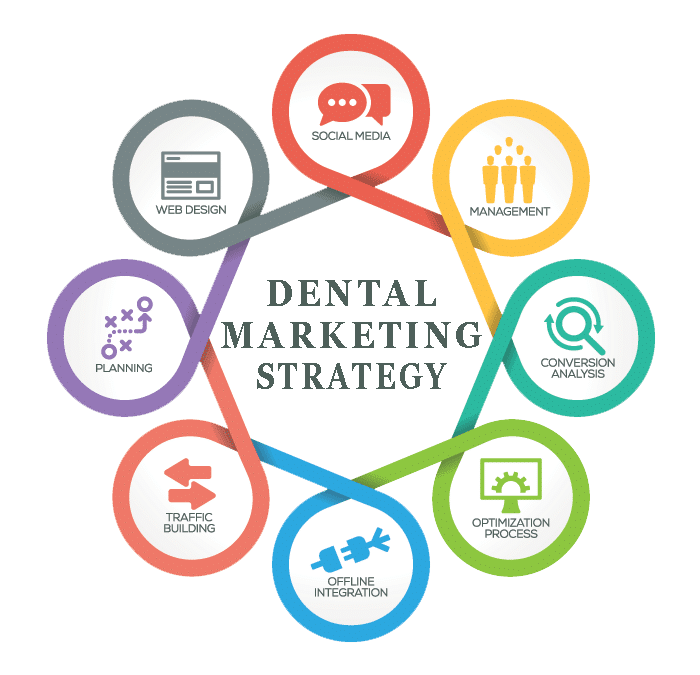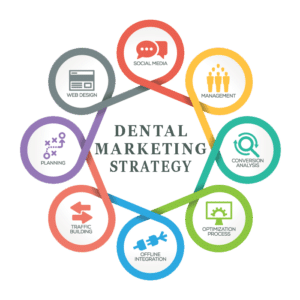
Progressive Dental Marketing vs. Harris & Ward
Progressive Dental Marketing vs. Harris & Ward: A Comprehensive Comparison of Dental Marketing Agencies
In the highly competitive dental industry, effective marketing strategies play a crucial role in attracting new patients and growing a practice. Two prominent players in the dental marketing field, Progressive Dental Marketing and Harris & Ward, have built a strong reputation for their services. In this comprehensive blog post, we will conduct a thorough and fair evaluation of these companies, focusing on three essential areas of business: Dental SEO, Google Ads, and Custom Website Design. Additionally, we will delve deeper into the creative assets, specifically photography and videography, which set Harris & Ward apart in the industry.

Dental SEO:
Progressive Dental Marketing
PDM has garnered a reputation for its data-driven approach to Dental SEO. Their team of SEO experts conducts in-depth keyword research, analyzing market trends and identifying relevant, high-traffic keywords specific to dental practices. The goal is to optimize dental office websites for search engines, ensuring they rank higher in search results and gain increased visibility in the local area.
Their local SEO strategies are particularly commendable, as they understand the importance of attracting nearby patients to visit their dental practices. By optimizing Google My Business listings and local directories, PDM helps dental practices gain prominence in local searches, ultimately boosting foot traffic and increasing patient inquiries.
The company also excels in on-page optimization, fine-tuning meta tags, headings, and content to align with search engine algorithms. Through this meticulous process, they enhance the overall user experience, encouraging visitors to engage with the website and convert into potential patients.
Harris & Ward
Similarly, Harris & Ward’s Dental SEO services are driven by comprehensive research and personalized strategies. Their SEO specialists work closely all year with each dental practice to understand their unique offerings, target audience, and local competition. Armed with this knowledge, they craft tailored SEO campaigns that emphasize the practice’s strengths and differentiate it from competitors.
Harris & Ward also prioritizes transparent reporting, regularly sharing performance metrics and progress updates with their clients. This approach enables dental practices to stay informed about their online presence and make data-driven decisions for continuous improvement.
Verdict – Dental SEO: Both Progressive Dental Marketing and Harris & Ward demonstrate expertise in Dental SEO, utilizing innovative strategies to increase the online visibility of dental practices and attract potential patients. Dental practices can feel confident partnering with either company for exceptional SEO campaigns tailored to their unique needs.
Google Ads:
Progressive Dental Marketing
PDM’s Google Ads management service is designed to generate targeted traffic and maximize return on investment for dental practices. Their certified Google Ads sales professionals create and manage pay-per-click (PPC) campaigns, continuously monitoring and optimizing them to ensure optimal performance.
Through extensive keyword research and competitor analysis, they identify relevant keywords that resonate with the target audience, helping dental practices reach potential patients who are actively searching for dental providers. By crafting compelling ad copy and incorporating persuasive calls-to-action, Progressive Dental Marketing aims to drive more leads with high click-through rates and conversions.
Their focus on data analytics is another strong point, as they track the performance of each campaign meticulously, identifying areas for improvement and capitalizing on successful strategies to enhance overall results.
Harris & Ward
Harris & Ward’s approach to Google Ads is characterized by a deep understanding of each dental practice’s unique selling points, benefits and target demographic. Their team of Google Ads specialists designs customized campaigns that effectively communicate the practice’s value proposition and encourage prospective patients to take action. Their experience in advertising dental implants, full arch cases, all-on-4, cosmetic dentistry, orthodontics, and more makes them a quality candidate to partner with as it relates to lead generation.
To ensure optimal results, Harris & Ward consistently monitors campaign performance, adjusting bids and keywords as needed to maximize return on investment. By staying ahead of market trends and leveraging audience insights, they create engaging ads that resonate with potential patients, fostering strong connections between the dental practice and its target audience.
Verdict – Google Ads: Both Progressive Dental Marketing and Harris & Ward provide comprehensive Google Ads services, demonstrating a commitment to driving targeted traffic and achieving desirable outcomes for dental practices. Their data-driven and personalized approaches equip dental practices with effective advertising solutions to reach their business goals.
Custom Website Design:
Progressive Dental Marketing
Progressive Dental Marketing prides itself on its templated website design skills, catering to the brand identity and vision of each dental practice. Their design team collaborates closely with clients, understanding their preferences, target audience, and desired aesthetics.
The end result is visually appealing and user-friendly websites that provide an exceptional browsing experience for potential doctors and patients. These websites are designed with responsive layouts, ensuring seamless navigation across various devices, including desktops, tablets, and smartphones.
Moreover, Progressive Dental Marketing integrates essential features into their websites, such as user-friendly appointment booking systems, educational resources, and informative content. By optimizing the website’s layout and content structure, they empower dental practices to effectively engage with their online audience and convert visitors into loyal patients.
Harris & Ward
Harris & Ward’s approach to custom website design revolves around creativity and originality. They understand that a dental practice’s website is often the first point of contact for potential patients, and thus, it must reflect the unique personality and values of the practice.
Their talented design team carefully crafts visually striking websites that not only captivate visitors but also ensure seamless functionality. Harris & Ward emphasizes the importance of user experience (UX) design, creating intuitive navigation and interactive elements that guide visitors through the website with ease.
Additionally, their custom websites are built to be fully responsive, adapting effortlessly to various screen sizes and devices. This focus on mobile responsiveness aligns with the modern user’s preference for browsing on smartphones and tablets, enhancing the overall user experience.
Verdict – Custom Website Design: Both Progressive Dental Marketing and Harris & Ward excel in delivering custom website design solutions that cater to the specific needs and preferences of their dental clients. Their commitment to creating visually stunning and user-friendly websites ensures that dental practices can establish a strong online presence and effectively showcase their services to potential patients.
Superior Creative Assets – Photography and Videography:
While both companies offer impressive services in Dental SEO, Google Ads, and Custom Website Design, Harris & Ward stands out with its exceptional creative assets, particularly in photography and videography.
Harris & Ward’s team of experienced photographers and videographers possess a unique talent for capturing the essence of dental practices through visuals. With an eye for detail and a passion for storytelling, they create imagery and videos that resonate emotionally with viewers.
Through captivating photography, Harris & Ward can showcase the dental practice, its team, and facilities in their best light. By highlighting the human element of dentists and patient experiences, these images establish a personal connection with potential patients, fostering trust and confidence in the practice.
Similarly, Harris & Ward’s videography services allow dental practices to convey their brand message effectively. Professionally produced videos can feature testimonials from satisfied patients, behind-the-scenes glimpses of the practice, and educational content that positions the practice as an authoritative source in dental care.
What Dental Marketing Agency Is Right For You?:
In conclusion, both Progressive Dental Marketing and Harris & Ward are esteemed dental marketing agencies, excelling in Dental SEO, Google Ads, and Custom Website Design. Dental practices seeking to enhance their online presence and attract new patients can confidently choose either company for their expertise and dedication to excellence.
While both companies offer competitive services in the core areas of dental marketing, Harris & Ward’s clear advantage lies in their superior creative assets, particularly photography and videography. The company’s commitment to visually striking content provides dental practices with a unique edge in effectively showcasing their services and connecting with potential patients on a deeper, emotional level.
Ultimately, dental practices must carefully consider their specific needs and goals when choosing a marketing partner. By conducting thorough research and understanding their preferences, they can make an informed decision and select the dental marketing agency that aligns best with their vision for success.
So now what?
In making this decision, dental practices should consider their target audience, budget and time constraints, and long-term business goals. Progressive Dental Marketing and Harris & Ward offer different strengths that cater to diverse practice requirements.
For practices seeking comprehensive and data-driven strategies, Progressive Dental Marketing presents an excellent choice. Their track record of success in Dental SEO and Google Ads, coupled with their user-friendly custom website designs, can provide a solid foundation for attracting potential patients online.
On the other hand, Harris & Ward’s emphasis on creative assets, including photography and videography, offers dental practices a unique opportunity to stand out in the competitive dental market. The emotional impact of high-quality visual content can help establish trust and foster strong patient relationships.
In conclusion, both Progressive Dental Marketing and Harris & Ward are reputable dental marketing agencies, each with its unique strengths. By carefully evaluating their services and creative assets, dental practices can determine which company is the best fit for their specific needs and growth objectives.
Ultimately, the key to a successful partnership with a dental marketing agency lies in open communication and collaboration. Dental practices should not hesitate to engage in conversations with both agencies, discussing their goals, concerns, and preferences. By doing so, they can gain valuable insights into each agency’s approach, ultimately leading them to choose the dental marketing partner that will maximize their potential for success.
As the dental industry continues to evolve and adapt to the digital landscape, both Progressive Dental Marketing and Harris & Ward remain committed to working towards helping dental practices thrive in a competitive market. Whichever agency a dental practice chooses, one thing is certain: with the right marketing strategy and creative assets, they can effectively attract new patients and build a lasting, successful practice.











